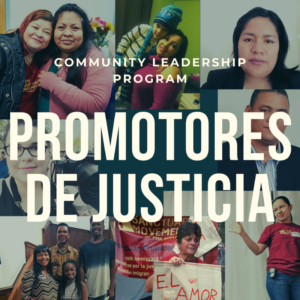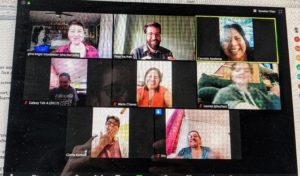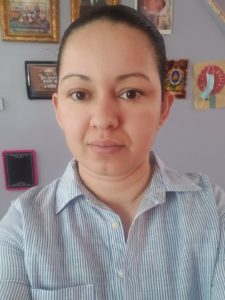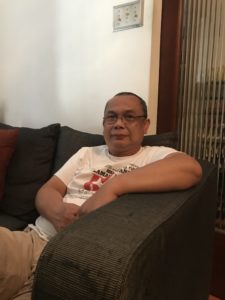When working for justice, the promotora model builds power in communities even during a pandemic
 July 1, 2020
Category: Featured, Long, Purpose
July 1, 2020
Category: Featured, Long, Purpose
Disclosures
Editor's note: You are free to republish this article both online and in print under a Creative Commons Attribution/No derivatives license, provided you do not edit the piece, make sure to attribute the author, mention that the article was originally published at Generocity, and link back to the original post.Updates
Updated to correct NSM's process of adoption of the promotora model. (07/16/20 at 7:30 a.m.)Lea este artículo en español.
On May 21, the New Sanctuary Movement of Philadelphia held a live Zoom meeting on its Facebook page with more than 100 members of the Indonesian, Afro-Caribbean and Latinx communities.
The interfaith immigrant justice nonprofit hosted as community members spoke directly and openly with Councilmember Helen Gym about how COVID-19 is impacting immigrants. Bertha Murcia, one of the seven NSM promotoras, thinks Gym expected a meeting with five or six people.
“To see the community show up like that had a big impact on her,” Murcia said. “She did take the time to listen to the speakers, and to hear the concerns of the community, and to see the need.”
While in the United States the promotora model is more often used to activate community health initiatives, in Latin America — where the model originated — the promotoras are also sometimes trained be hands-on sources of information on legal and social concerns within their communities.
NSM started focusing on leadership development in 2010. Three years ago, Peter Pedemonti and Blanca Pacheco, the co-directors of the organization, were evaluating their “leadership school” program as well as the lessons from hiring members to staff, and came up with the promotora model.
The first of those who would become promotores (spelled with an “e” to indicate gender-inclusiveness) went through one month of organizer training. But Pedemonti and Pacheco subsequently realized that these frontline community workers needed more rigorous and more frequent training — and they needed to be compensated for their work.
At NSM, the promotores are focused on concerns that have included preparing and accompanying community members for court dates and establishing a community bail fund for immigrants. Pedemonti sees experiential education as the strength of the promotora model. For example, grandmothers and mothers born and raised outside of the United States bring different perspectives and experiences to the work, and the model honors their collective wisdom and skills.
But can the hands-on, neighbor-to-neighbor interaction that is so integral to the model be adapted to effectively grapple with the problems the COVID-19 pandemic is creating or exacerbating?
Pedemonti told Generocity that COVID-19 has left many of their community members in a dire situation since immigrants are unable to receive government stimulus money. He’s seen families that are facing hunger, intimidation from landlords, and constant messaging from the government that their survival isn’t important.
The organization joined a coalition of 40 other groups that launched a COVID-19 relief fund for immigrants. “The fund raises money to provide financial support to immigrant families who have been excluded from the stimulus packages,” Pedemonti said
With that, and the funds NSM has individually raised, the organization has been able to send checks to 150 families. And, he added, “There are 100 more families from Latinx, Indonesian and Afro-Caribbean communities on our waitlist for urgent relief.”
Pivoting in pandemic
According to Pedemonti, NSM has continued its primary work and campaigns but has had to pivot in their delivery of COVID solutions.
For a start, NSM hired five of its community members who lost their fulltime jobs because of COVID-19.
The promotores started using phone-banking and weekly Zoom meetings to remain in close contact with community members during this time of crisis. Since the pandemic hit, they’ve made 300+ phone calls to the community, and do follow ups as needed.
Promotores tell members how to access local resources like food banks, for example. But when they learned from Indonesian and Afro-Caribbean community members that the food from available food banks was not culturally appropriate, they also helped troubleshoot and raised those concerns with representatives from the City of Philadelphia.
The promotores also held virtual community meetings, virtual vigils and “know your rights” presentations for tenants via Zoom, where they can hear critical concerns of community members and take action on them. For example, at one of their virtual meetings they heard about a landlord who had been harassing one of the community members about rent. The promotores called the landlord after the meeting and were able to negotiate an amicable agreement.
Virtual meetings are held twice a week, one for Latinx community members, and the other for the Indonesian and Afro-Caribbean members. On average, about 40 to 50 Latinx community members and 15 Indonesian and Afro-Caribbean community members attend the weekly meetings.
The promotores have had to pivot with the pivot
Murcia is one of the five NSM promotores who are Latinxs, and has been a promotora for two years.
“My father has always worked with the neediest communities in my country [Honduras] so it could be said that I [always] had an idea of how to get involved with the community and how to organize,” Murcia told Generocity.
Being informed is crucial to the Latinx immigrant community in Philadelphia, she said. “That is why we hold workshops and [make] calls.”
“Normally promotoras work to accompany people who go to court. We always worked with congregations,” she said. “After COVID-19, our assignment was to call all members of [those] congregations and ask them how we could be supportive. Most people rent their apartments, so people were really concerned about paying their rent, paying their bills, getting enough food and healthcare.”
Before the pandemic, promotoras would meet with people at a specific place. Now they do everything on the phone. Murcia makes about 15 hours of phone calls a week. It is a lot of phone calls, she said, but less than what she would like to be doing. Her hours are constrained by the fact that her three boys aren’t in school and have online classes, and that takes time away from her efforts.
Every Wednesday she is part of a massive Zoom call, Murcia said, and all members receive the link to the meeting by phone. “We all get together on Zoom and we tell them where they can get food, how they can get support, how they can get tested for Coronavirus.”
Murcia had never used Zoom before the pandemic. “It was a big challenge for me and for many of us to learn how to use Zoom.”
The promotores had to instruct community members on how get into the meetings and explain tech tasks. “We were sending them text messages: ‘this is how you unmute your microphone, this is how you turn your camera on.’ It was difficult but we had patience and we went little by little.”
“After four months, I think we have become experts on Zoom.”
She said that in the beginning about 17 people would show up for a Zoom call, by the time they had their meeting with Gym, however, they found out their Zoom account only allowed for 100 participants when the number of people wanting to participate exceeded the limit.
“So, going from zero to that level of participation has been really positive,” Murcia said.
Sometimes promotoras are on the phone and learn that the person they are speaking to is in extremely precarious circumstances. “It’s really hard for us as immigrants to see other immigrants suffering in this way,” she said. “NSM doesn’t have its own way of having a big fund. We rely on donations and apply for grants. With all the supporters we have, we have been able to help a lot of them.”
“It is important that people in Philadelphia realize the Latino community has a great need,” Murcia said. “[And to understand] that the Latino community has worked hard to make PA a strong state economically whether we’ve worked formally or informally.”
The limited set of total funds the organization can draw upon also impacts the promotores.
“NSM tries to pay us a small amount for some of the hours we do,” she said, but given the hours they have to put in to serve their community, “sometimes we are working with some compensation; sometimes we are doing this voluntarily.”
If sufficient funding weren’t a concern, how would Murcia expand the promotora program at NSM?
“It is necessary to reach more people from different communities,” she said. “The most important thing is that we need [promotores] who speak their own language so the communities understand the information they are receiving.”
Roedy Wibisono, an Indonesian promotor for the past five years, agrees with Murcia. He told Generocity that if there were more funding he would expand the promotora program to involve as many people as possible.
When he started as a promotor, he worked to get PA drivers’ licenses for immigrants, traveling to Harrisburg and meeting with congresspeople from both sides of the aisle.
Wibisono was familiar with the promotora model before becoming part of the NSM program, because he was a student activist in Indonesia from 1996 to 1998, when he was in college. “Empowering and advocating for the marginalized were my activities,” he said.
There were benefits to becoming a promotor, he said, including access to help, since so many members of the Indonesian community are ineligible to get government assistance.
After the lockdown, many of them lost their source of income.
Wibisono works about 10 hours a week on the phone, sometimes more, in his role as a promotor. He calls people in the morning, and some ask to be called back around 7 or 8 p.m. He tries to get them at the best time to have a real conversation.
Through his calls, he tries to figure out the condition people are in: “how are they doing with their health, their food, supplies, jobs. Most of the people lost jobs and a lot of them have kids,” he said.
Before he started making these calls, NSM offered him, and the other promotores, a virtual training session focused on how to approach people and ask questions to assess needs.
Like Murcia, Wibisono saw that many community members were not tech savvy, but participated anyway, and during the May meeting with Gym, spoke about buying food those in the Indonesian community who are experiencing hunger. St. Thomas Aquinas Church is helping community members with groceries, and some Indonesians themselves are providing funds to buy culturally appropriate groceries.
Wibisono said he believes the promotores have had the greatest impact on their communities by informing them about their rights, especially workers’ rights.
A portable model
Pedemonti said there is no difference in the way the Latinx and the Indonesian communities reacted initially to the promotora model, since the work is based on relationships within those varied communities. They listen to the community first, then shape their outreach and organizing accordingly.
The model, he added, would be replicable in other non-Latinx immigrant communities.
“We’re building relationships and showing members they are not alone,” Pedemonti said. “This is what we always do. It’s part of building power in communities.”
Project
‘Will the promotora model survive — or thrive — during the COVID-19 pandemic?’Trending News














